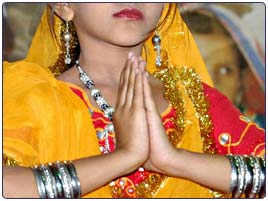ISKCON Presents at Gathering of Hindu Leaders
By ISKCON Communications Staff | Dec 21, 2007

Orlando, Florida – More than one hundred delegates, representing several Hindu temples and organizations in North America, gathered for the “Dharma Summit” held on December 14 – 16. The three-day meeting called together leaders from various sampradayas to address issues of common concern and share best practices. Vyenkata Bhatta Dasa, the Hare Krishna Movement’s North American Director of Communications, attended as a representative of the International Society for Krishna Consciousness (ISKCON). Vyenkata is also a part of the ISKCON News editorial team.
Vyenkata facilitated a discussion about the persecution of ISKCON devotees in Kazakhstan, and gave a presentation on how to respond to positive and negative portrayals of Hinduism in the popular media. He also served as a panelist on a workshop addressing the sensitive issue of interfaith marriage and conversion. Other presenters covered a wide range of additional issues, including Anuja Prashar’s informative research on the efforts of Evangelical Christian missionaries to target Hindus, Jnanesvari Devi sharing media tips drawn from her experience leading the Barsana Dhama community in Austin, and a comparison of the challenges and opportunities facing the Jewish and Hindu communities by Professor Nathan Katz (from the University of Florida).
“I was very happy to be part of the Dharma Summit,” Vyenkata said. “It is not so easy to take a balanced, pragmatic approach to collectively addressing shared concerns, while still celebrating the diversity that makes up the Vedic traditions. This is exactly the type of mood that the organizers of the Summit tried very sincerely to foster.”
ISKCON devotees from nearby Gainesville also participated in the event by catering Friday evening’s meal and performing kirtana. In light of the Summit’s theme of thinking outside of the box and encouraging outreach to the broader community, the organizers worked closely with the Gainesville devotees to create a “theme dinner” designed to illustrate their successful Krishna Lunch program. The devotee cooks substituted traditional Indian vegetarian fare like dahl, rice, and subji with the Krishna Lunch meal voted most popular by the University of Florida community: spaghetti with vegetarian protein, salad and dynamite dressing, halavah, and lemonade—all sanctified by first being offered to the Lord with love and devotion.
After the dinner, a group of devotees took to the stage for a performace of mellow, meditative kirtan chanting. The performance featured the Hare Krishna mahamantra being sung in several different melodies and accompanied by harmonium, mridanga drum, hand cymbals, and acoustic guitar. A large projection screen cycled through a collection of Krishna art images to compliment the singing, and several of the audience members clapped and sang along with the chorus. Between songs, a few devotees shared insights about Krishna consciousness and the importance of sharing Vedic knowledge with others.
Bhaktin Kelly, an active participant at the Gainesville center and an anthropology major in her senior year at UF, particularly won over the audience with the heartfelt story of how she first became involved with Krishna consciousness through the Krishna Lunch program. Kelly, a bright-faced All-American girl dressed in a simple but elegant sari, had audience members speechless as she described her journey from the nominal Christianity of her childhood, to the atheism of her youth, and finally to her adopted practice of the Vaisnava (Hare Krishna) faith.
“After Kelly’s talk, several delegates approached me to express how much they appreciated the miracle that Srila Prabhupada performed in spreading Sanatana Dharma around the world,” Vyenkata recalled.
ISKCON belongs to the Gaudiya Vaisnava sampradaya, a monotheistic tradition within Vedic or Hindu culture. ISKCON devotees recognize that Hindu culture is vast, and the term encompasses numerous theologies, philosophies, religious traditions and spiritual cultures. In participating in events such as the Dharma Summit, Krishna devotees seek to represent the Vaisnava tradition while building bridges to others who also base their faith on the Vedic scriptures.
“I know that I learned a lot from the other delegates,” Vyenkata said, “and I hope that I was able to be of some benefit by sharing some of our [ISKCON] experiences, as well.”















